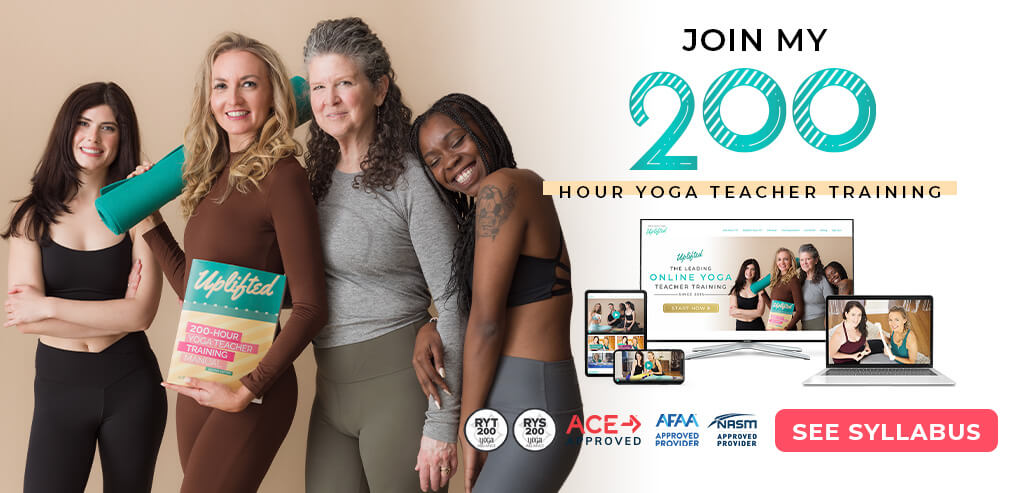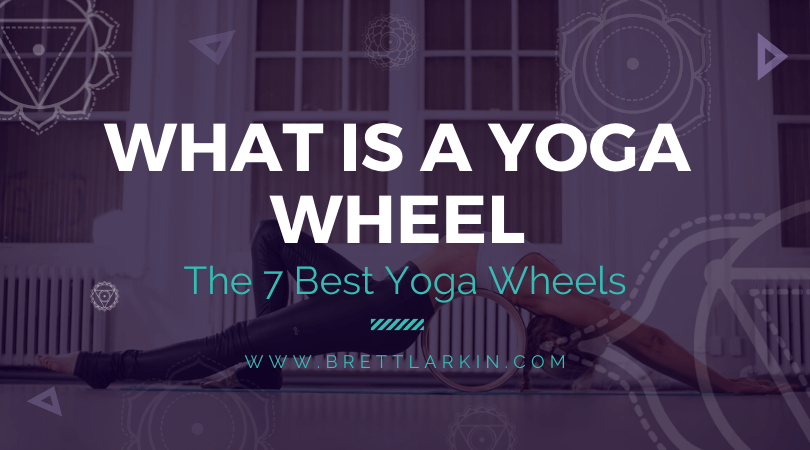
You may have noticed a new prop in the yoga world. Perhaps you’ve used it at your local yoga studio or seen it gracing the feed of your favorite yogi on Instagram. This my friends is the yoga wheel.
Yoga wheels have been quickly gaining popularity and for good reason. It is unique and no other prop can perform in quite the same way. Whether you are a beginner or an advanced practitioner, the yoga wheel can be helpful in your practice.
In this post:
What Is A Yoga Wheel
What Size Are Yoga Wheels?
Benefits Of Using A Yoga Wheel
10 Ways To Use A Yoga Wheel
How Do I Choose A Yoga Wheel? 7 Best Yoga Wheels Reviewed
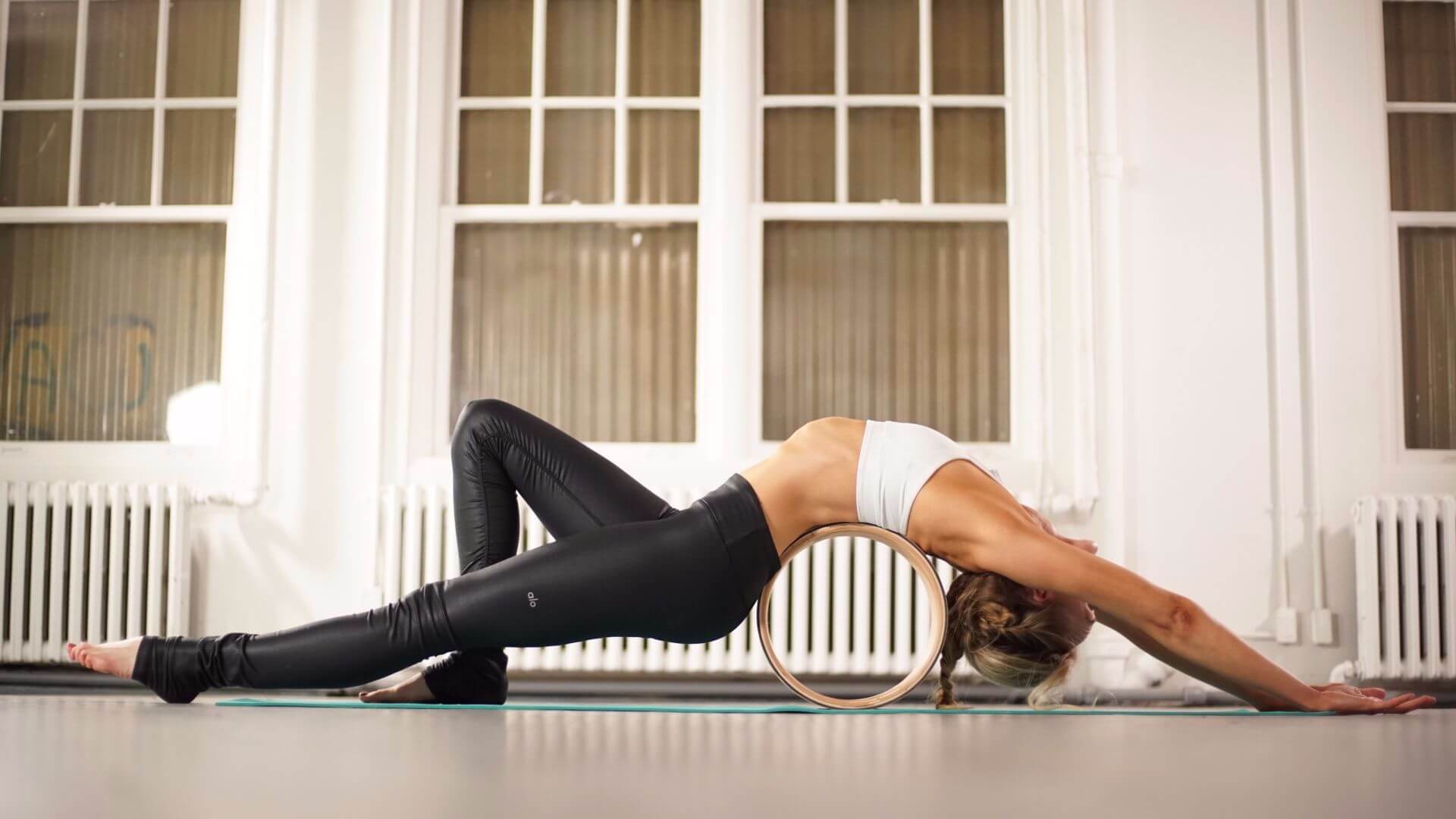
What Is A Yoga Wheel
Despite the name, this prop is not only limited to use in a yoga practice. It can be used in a variety of different stretches and exercises.
It is constructed of a dense plastic circle on the inside and is covered with a soft padding on the outside. There are some different options in terms of the size and material.
You might also like: Best Yoga Blocks Review: Which is the Best Block for You?
What Size Are Yoga Wheels?
You will generally find three sizes of yoga wheels. Each one will serve a slightly different purpose and difficulty level. Nearly all yoga wheels have the same width, but the diameter varies.
The largest wheel size is a 12 – 13 inch diameter. This size is best for beginners and offers the most support for backbends. If you are just starting out or have limited flexibility, this might be the size for you.
The next size down would be a 10 inch diameter wheel. This size will offer a deeper stretch and a higher pressure massage. The smallest size measures at about 6 inches in diameter and will give you the deepest stretch and opening.
Benefits Of Using A Yoga Wheel
There are a lot of different ways to the yoga wheel and you can find a ton of different exercises online. But, here are some general ways that using a yoga wheel can strengthen your body and transform your practice.
1. Helps you move into advanced yoga postures
Moving into a backbend or other challenging posture can be scary the first time. There is also the potential for injuries as your body might not have the muscle strength to perform it properly. Using a yoga wheel can ease some of your fear and also help you achieve the proper alignment when first starting out. Holding the posture with a prop not only offers you support but is helping you strengthen the necessary muscles at the same time
2. It can help to prevent injury
This kind of goes hand in hand with the reason above. By using the wheel to ease into challenging postures, you can get the correct alignment before going into wheel pose fully. As we all know, proper alignment is the key to maintaining a long, healthy yoga practice.
3. Counteracts the effects of too much screen time
Most of us spend a lot of time in front of a screen of some sort. This constant screen time can lead to hunched shoulders and a rounded neck. This creates a lot of tension and can lead to headaches, back pain and other problems. A yoga wheel can open up the chest and counteract all of that hunching.
You might also like: What Is The Ultimate Best Non-Slip Yoga Mat? Here Are My Top 3 Picks
10 Ways To Use A Yoga Wheel
There are so many different ways to use the yoga wheel in your practice, or really any exercise regimen. It can be customized completely to the way you workout. The wheel can be used to improve flexibility and open the body, or in balancing postures to build muscle.
Here are some specific ways to incorporate the yoga wheel into your daily exercise routine.
1. Wheel-Assisted Child’s Pose
Child’s pose is the classic resting pose. It also helps to gently stretch the hips and back. Sit back on the heels, bend forward and reach the arm overhead on the mat. Bring your hands onto the yoga wheel to provide you with a deeper opening of the back and shoulders.
2. Reclined Easy Pose
Come into any comfortable seat, such as Easy Pose, and place the yoga wheel behind you. Lean back onto the wheel and place your arms along your sides. This will open the chest and work to counteract a day spent hunching over a computer.
3. Supported Bridge
Using a yoga wheel for a supported bridge will give a much greater heart opening than using a block. The shape of the wheel complements the natural curvature of the spine and can be more comfortable to release into.
4. Supported Side Stretch
The curve of the wheel can also be a great way to gently open the side body. While sitting in easy pose with the spine straight, place the wheel next to you. Then, lean to the side draping your body over the wheel. You can leave your hand on the floor or sweep it overhead with the palm facing down.
5. Lizard Pose
If lizard pose wasn’t enough of a stretch for you, you can intensify with the use of the yoga wheel. Come into lizard pose with the front knee bent to 90 degrees and the back leg straight. The wheel can be placed either under the back foot or the front foot. Either positioning will give you a deeper opening in the hips.
6. Balancing Side Plank
Looking to up the intensity of your side plank? Try placing the bottom hand on your yoga wheel and then balancing. Your body will have to work even harder to stay stable on the rounded surface of the wheel.
7. Plank Pose
Place one foot on the wheel and come into plank position. Slightly raise the other leg and focus on keeping the body stable. This really requires the entire body to be activated and is a great exercise for core strengthening.
8. Assisted Shoulder Stand
Whether you are working your way up to it or have a strong shoulder stand, the wheel can be helpful. Place the wheel right at the sacrum and straighten the legs overhead. The support of the wheel can help you to really just relax into this pose and enjoy the benefits of being inverted without much effort.
9. Handstand Prep
Handstand can be scary at first, but using the wheel can help you get there. Place your hands on the ground with the tops of the feet on the wheel. Roll the wheel until your hips, shoulders and wrists line up. You can feel the proper alignment while also strengthening the core and arms.
10. Forearm stand
Place the wheel against the back of the head and place the forearms down creating your foundation. Grab a hold of the wheel, creating traction and building stability. Slowly walk the feet forward until your pelvis is in line with your shoulders. You can then play around with lifting one or both legs. Even just holding onto the wheel and feeling the correct alignment can help you master this pose.
How Do I Choose A Yoga Wheel? 7 Best Yoga Wheels Reviewed
There are a lot of different options out there so the choice can be overwhelming. Here are some of the best based on suggestions from friends and teachers that I’ve talked to.
1. UpCircleSeven [Pro Series] Yoga Wheel
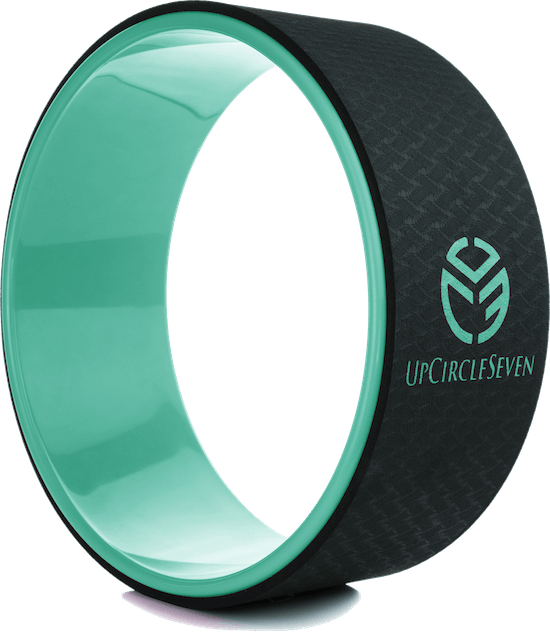
This one is the best of both worlds, strong yet soft. It can support weight up to 550 lbs, but at the same time it has the thickest padding of most other wheels on the market. The high quality padding is also sweat resistant so you don’t have to worry about lingering odors after your challenging classes.
2. Dharma Yoga Wheel
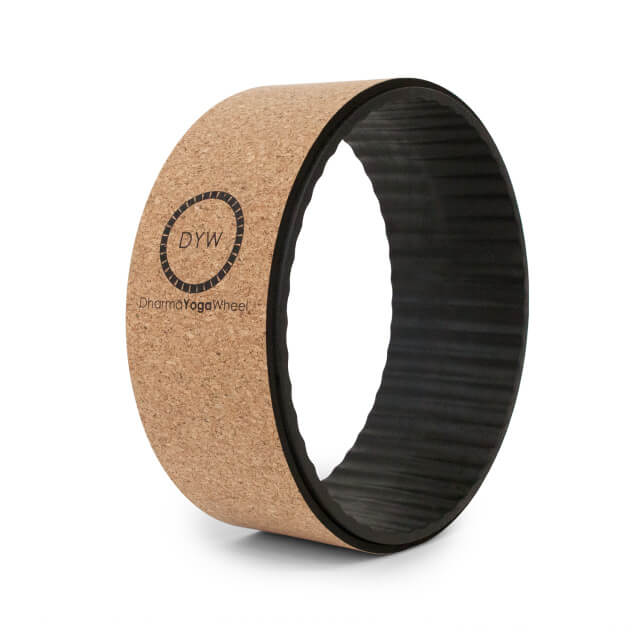
For those yogis who are always on the go, this is a great lightweight and portable wheel. It will easily fit into your gym bag or carry on luggage. In the case that you are not completely happy with this wheel, they offer a money back guarantee.
3. We The Planet
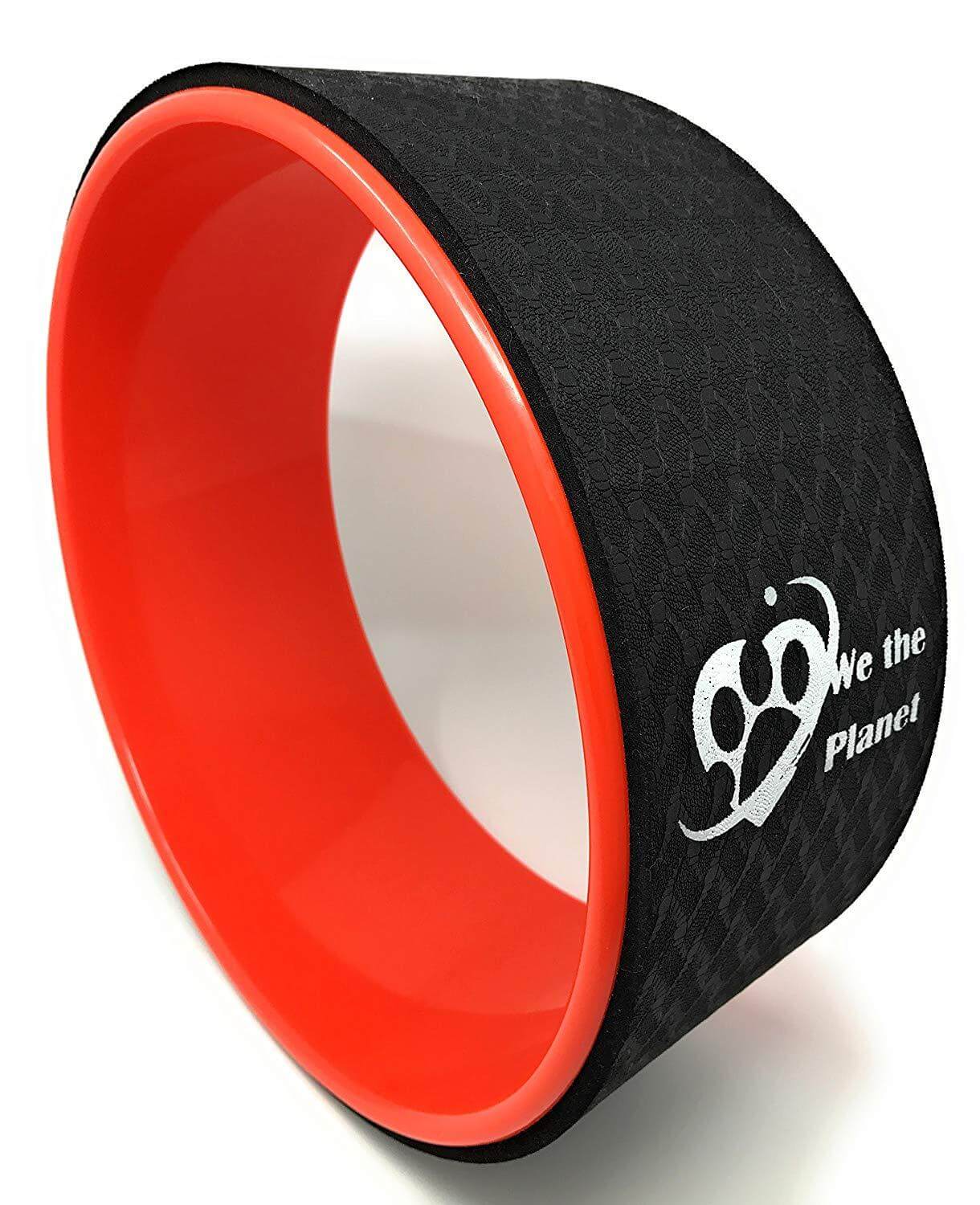
Environmentalists rejoice! This yoga wheel is made from recycled materials. It is made with an extra thick, nontoxic foam padding which also happens to be antimicrobial. This is a great and affordable option. The only con I’ve heard from users is the lack of color options.
4. The Shakti Yoga Wheel
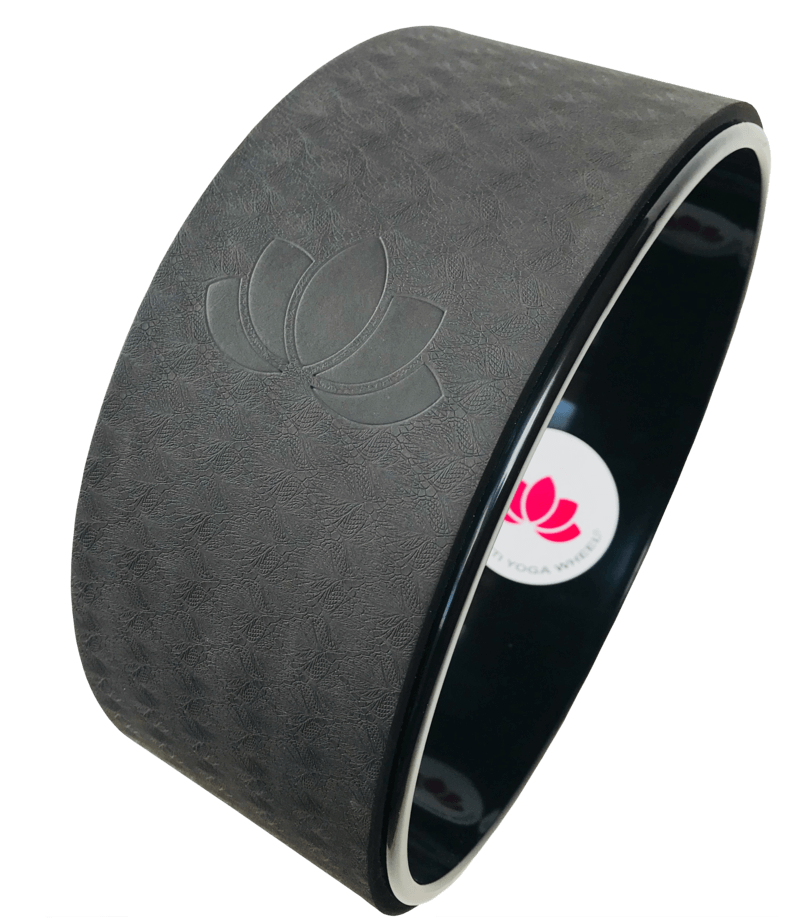
Offered in a variety of different colors to satisfy any yogi, the Shakti wheel can be easily carried around from home to studio. The eco-friendly rubber padding will help you comfortably move into backbends.
5. Seigla Basic Yoga Wheel
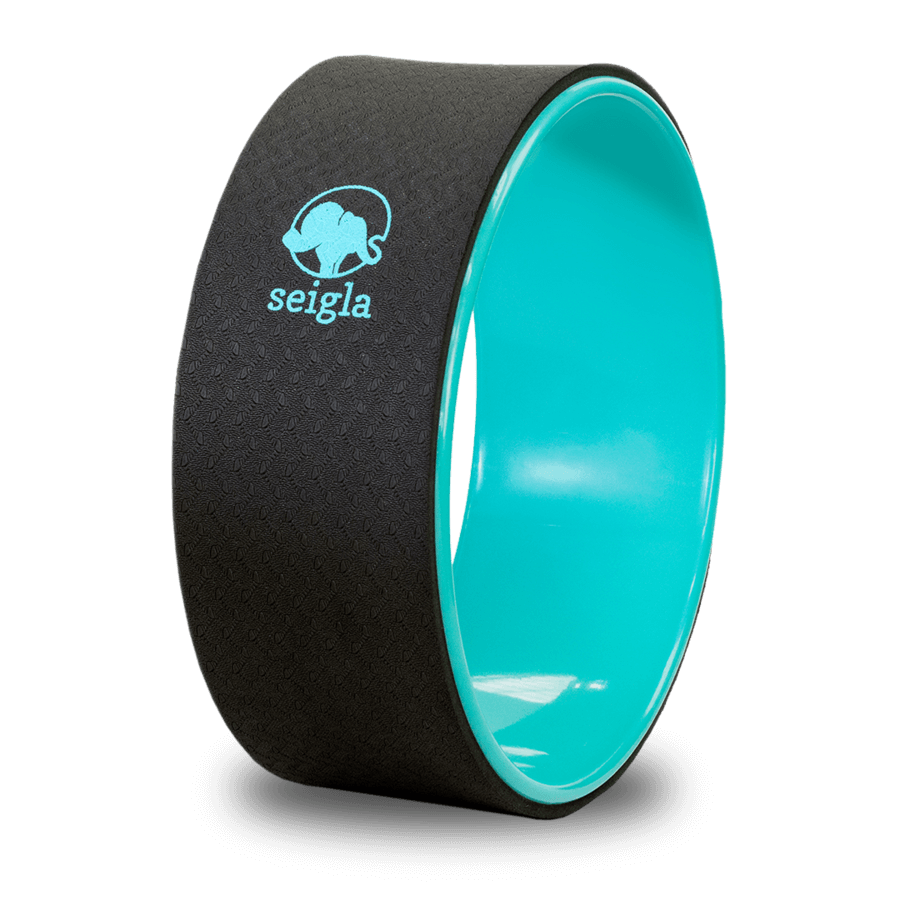
Purchasing this yoga wheel will give you something completely unique. The process used to make the inside is their own signature process is claimed to be stronger than the PVC used to make most other models. They are also the only brand to feature hybrid TPE foam which is sweat resistant and anti-bacterial. Seigla is a well-made and affordable option.
6. BodyGood Cork Yoga Wheel
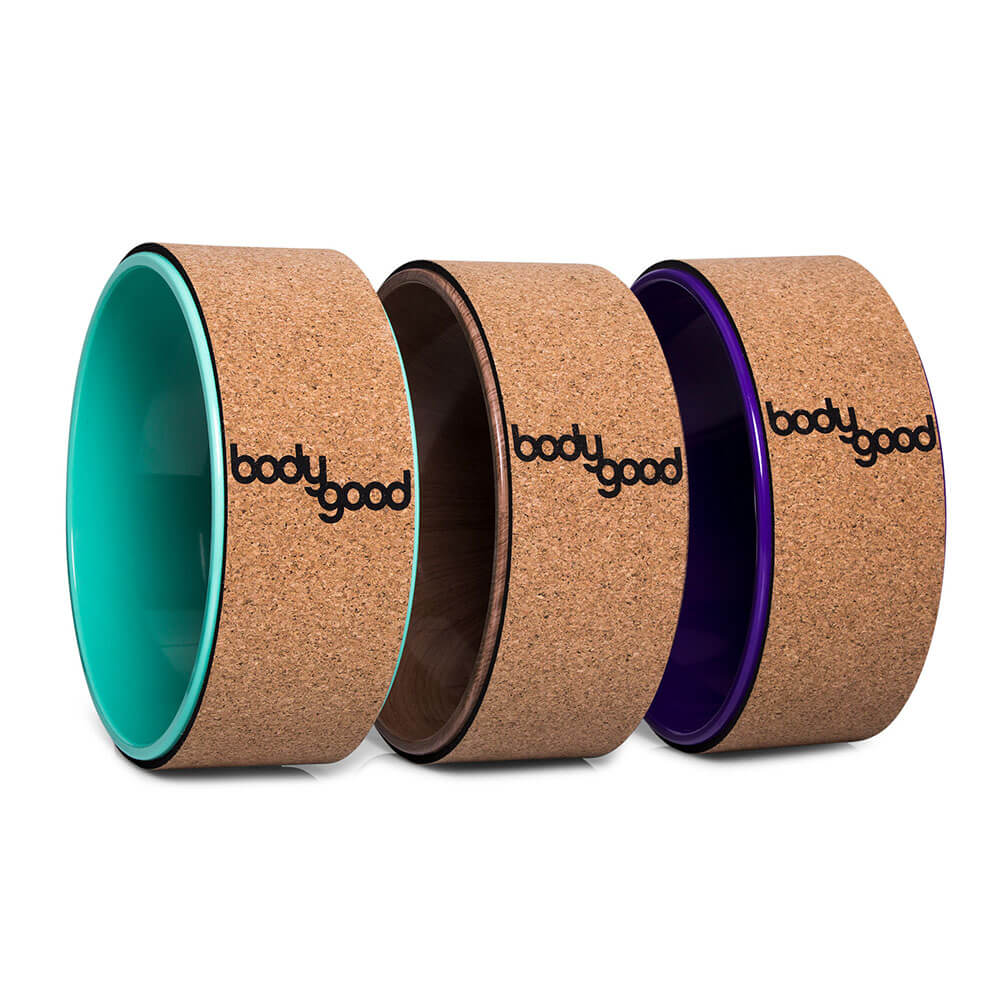
Most yoga wheels on the market have a yoga mat like padding, so the cork on this one makes it unique. Although cork might not give as much cushion, some people might prefer it because it’s durable and easy to clean. The outside padding is typically the first thing to wear out on the yoga wheel, so choosing a cork wheel can ensure a longer life.
7. Mindful Yoga Wheel
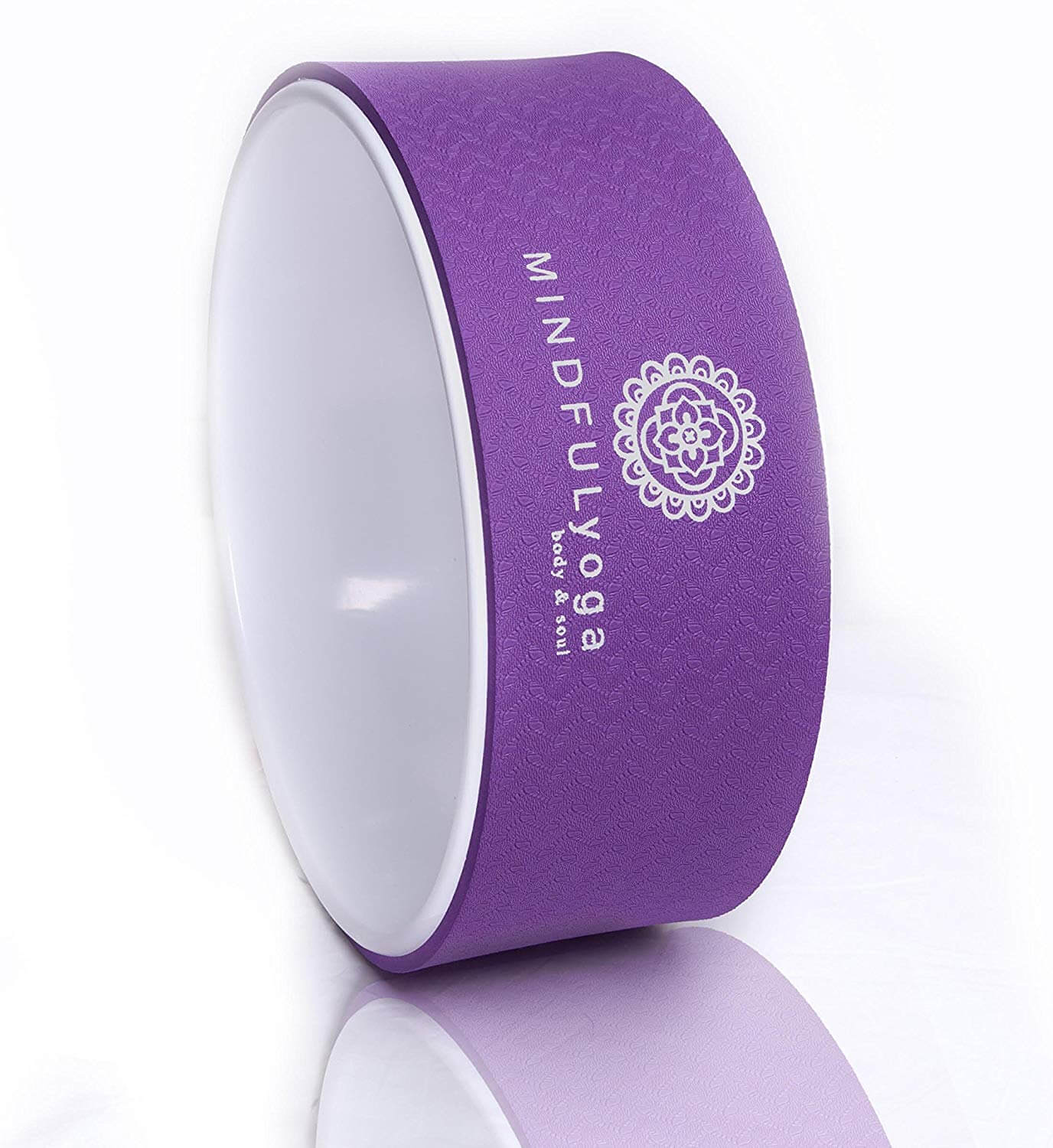
This durable wheel is designed for repeated use and can support weight up to 500 lbs. The non slip padding is made from environmentally friendly materials and is naturally ani-bacterial.
So there you have it, everything (and more) that you’ve ever wanted to know about yoga wheels!
Experience 3 Training Videos from Inside My 200-Hour Online YTT
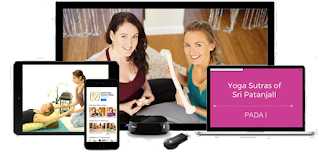
YOU MIGHT ALSO LIKE
- What is Kriya Yoga? The Philosophy and Practice
- Uddiyana Bandha: Tapping Into Your Deep Core
- 4 Reasons Hasta Bandha Is Essential To Your Yoga Practice
- Vitarka Mudra: What It Is and How Do You Use It?
- Shakti Mudra: What It Is and How Do You Do It?
- Garuda Mudra: What It Is and How Do You Use It?
- Kali Mudra: What It Is and How Do You Do It?
- Shunya Mudra: What It Is and How Do You Do It?
- Varuna Mudra: What It Is and How Do You Use It?
- Vayu Mudra: What It Is and How Do You Use It?
- Samana Vayu: The Energy of Balance & How to Access It
- Apana Vayu: The Energy of Release & Surrender
- Udana Vayu: The Ascending Wind
- Prana Vayu: The Breath of Vitality
- Vyana Vayu: The Energetic Secret to Flow

